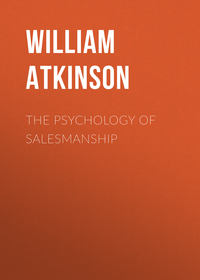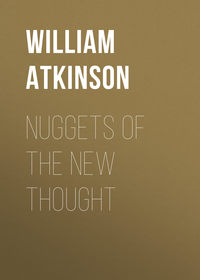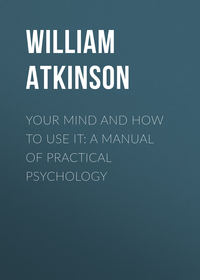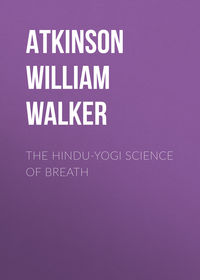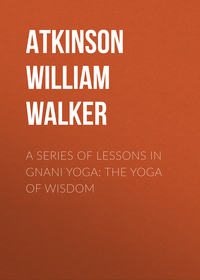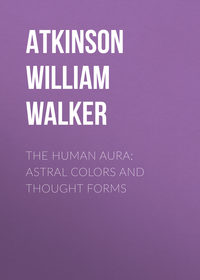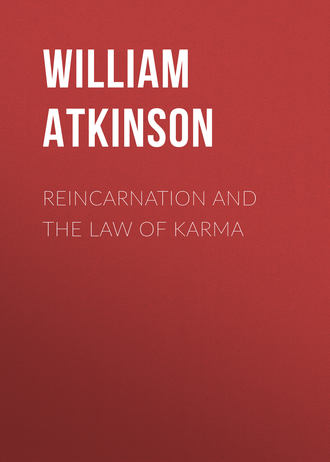 полная версия
полная версияReincarnation and the Law of Karma
It is further argued that the feeling of "original sin" of which so many people assert a consciousness, may be explained better by the theory of Reincarnation than by any theological doctrine. The orthodox doctrine is that "original sin" was something inherited from Adam by reason of our forefather's transgression, but this jars upon the thought of today, as well it might, for what has the "soul" to do with Adam – it did not descend from him, or from aught else but the Source of Being – there is no line of descent for souls, though there may be for bodies. What has Adam to do with your soul, if it came fresh from the mint of the Maker, pure and unsullied – how could his sin taint your new soul? Theology here asserts either arrant nonsense, or else grave injustice. But if for "Adam" we substitute our past existences and the thoughts and deeds thereof, we may understand that feeling of conscious recognition of past wrong-doing and remorse, which so many testify to, though they be reasonably free from the same in the present life. The butterfly dimly remembers its worm state, and although it now soars, it feels the slime of the mud in which it once crawled.
It is also argued that in one life the soul would fail to acquire the varied experience which is necessary to form a well rounded mentality of understanding. Dwarfed by its limited experience in the narrow sphere occupied by many human beings, it would be far from acquiring the knowledge which would seem to be necessary for a developed and advanced soul. Besides this there would be as great an inequality on the part of souls after death, as there is before death – some would pass into the future state as ignorant beings, while others would possess a full nature of understanding. As a leading authority has said: "A perfected man must have experienced every type of earthly relation and duty, every phase of desire, affection and passion, every form of temptation and every variety of conflict. No one life can possibly furnish the material for more than a minute section of such experience." Along this same line it is urged that the soul's development must come largely from contact and relationship with other souls, in a variety of phases and forms. It must experience pain and happiness, love, pity, failure, success – it must know the discipline of sympathy, toleration, patience, energy, fortitude, foresight, gratitude, pity, benevolence, and love in all of its phases. This, it is urged, is possible only through repeated incarnations, as the span of one life is too small and its limit too narrow to embrace but a small fraction of the necessary experiences of the soul on its journey toward development and attainment. One must feel the sorrows and joys of all forms of life before "understanding" may come. Narrowness, lack of tolerance, prejudice, and similar forms of undeveloped consciousness must be wiped out by the broad understanding and sympathy that come only from experience.
It is argued that only by repeated incarnations the soul is able to realize the futility of the search for happiness and satisfaction in material things. One, while dissatisfied and disappointed at his own condition, is apt to imagine that in some other earthly condition he would find satisfaction and happiness now denied him, and dying carries with him the subsconcious desire to enjoy those conditions, which desire attracts him back to earth-life in search of those conditions. So long as the soul desires anything that earth can offer, it is earth-bound and drawn back into the vortex. But after repeated incarnations the soul learns well its lesson that only in itself may be found happiness – and that only when it learns its real nature, source, and destiny – and then it passes on to higher planes. As an authority says: "In time, the soul sees that a spiritual being cannot be nourished on inferior food, and that any joy short of union with the Divine must be illusionary."
It is also argued that but few people, as we see them in earth-life, have realized the existence of a higher part of their being, and still fewer have asserted the supremacy of the higher, and subordinated the lower part of the self to that higher. Were they to pass on to a final state of being after death, they would carry with them all of their lower propensities and attributes, and would be utterly incapable of manifesting the spiritual part of their nature which alone would be satisfied and happy in the spiritual realms. Therefore, it needs repeated lives in order to evolve from the lower conditions and to develop and unfold the higher.
Touching upon the question of unextinguished desire, mentioned a moment ago, the following quotation from a writer on the subject, gives clearly and briefly the Reincarnationist argument regarding this point. The writer says: "Desire for other forms of earthly experience can only be extinguished by undergoing them. It is obvious that any one of us, if now translated to the unseen world, would feel regret that he had not tasted existence in some other situation or surroundings. He would wish to have known what it was to possess wealth and rank, or beauty, or to live in a different race or climate, or to see more of the world and society. No spiritual ascent could progress while earthly longings were dragging back the soul, and so it frees itself from them by successively securing them and dropping them. When the round of such knowledge has been traversed, regret for ignorance has died out." This idea of "Living-Out and Out-Living" is urged by a number of writers and thinkers on the subject. J. Wm. Lloyd says, in his "Dawn Thought," on this subject: "You rise and overcome simply by the natural process of living fully and thus outliving, as a child its milk-teeth, a serpent his slough. Living and Outliving, that expresses it. Until you have learned the one lesson fully you are never ready for a new one." The same writer, in the same book, also says: "By sin, shame, joy, virtue and sorrow, action and reaction, attraction and repulsion, the soul, like a barbed arrow, ever goes on. It cannot go back, or return through the valves of its coming. But this must not be understood to be fulfilled in one and every earth-visit. It is true only of the whole circle-voyage of the soul. In one earth-trip, one 'life,' as we say, it may be that there would nothing be but a standing still or a turning back, nothing but sin. But the whole course of all is on." But there is the danger of a misunderstanding of this doctrine, and some have misinterpreted it, and read it to advise a plunging into all kinds of sinful experience in order to "live-out and out-live," which idea is wrong, and cannot be entertained by any true student of the subjects, however much it may be used by those who wish to avail themselves of an excuse for material dissipation. Mabel Collins, in her notes to "Light on the Path," says on this subject: "Seek it by testing all experience, and remember that, when I say this, I do not say, 'Yield to the seduction of sense, in order to know it.' Before you have become an occultist, you may do this, but not afterwards. When you have chosen and entered the path, you cannot yield to these seductions without shame. Yet you can experience them without horror; can weigh, observe and test them, and wait with the patience of confidence for the hour when they shall affect you no longer. But do not condemn a man that yields; stretch out your hand to him as a brother pilgrim whose feet have become heavy with mire. Remember, O disciple! that great though the gulf may be between the good man and the sinner, it is greater between the good man and the man who has attained knowledge; it is immeasurable between the good man and the one on the threshold of divinity. Therefore, be wary, lest too soon you fancy yourself a thing apart from the mass." And again, the same writer says: "Before you can attain knowledge you must have passed through all places, foul and clean alike. Therefore, remember that the soiled garment you shrink from touching may have been yours yesterday, may be yours tomorrow. And if you turn with horror from it when it is flung upon your shoulders, it will cling the more closely to you. The self-righteous man makes for himself a bed of mire. Abstain because it is right to abstain, not that yourself shall be kept clean."
It is also argued that Reincarnation is necessary in order to give the evolving races a chance to perfect themselves – that is, not through their physical descendants, which would not affect the souls of those living in the bodies of the races to-day, but by perfection and growth of the souls themselves. It is pointed out that to usher a savage or barbarian to the spiritual planes after death, no matter how true to his duty and "his lights" the soul had been, would be to work an absurd translation. Such a soul would not be fitted for the higher spiritual planes, and would be most unhappy and miserable there. It will be seen that Reincarnationists make quite a distinction between "goodness" and "advancement" – while they recognize and urge the former, they regard it as only one side of the question, the other being "spiritual growth and unfoldment." It will be seen that Reincarnation provides for a Spiritual Evolution with all of its advantages, as well as a material evolution such as science holds to be correct.
Concluding this chapter, let us quote once more from the authority on the subject before mentioned, who writes anonymously in the pamphlet from which the quotation is taken. He says: "Nature does nothing by leaps. She does not, in this case, introduce into a region of spirit and spiritual life a being who has known little else than matter and material life, with small comprehension even of that. To do so would be analogous to transferring suddenly a ploughboy into a company of metaphysicians. The pursuit of any topic implies some preliminary acquaintance with its nature, aims, and mental requirements; and the more elevated the topic, the more copious the preparation for it. It is inevitable that a being who has before him an eternity of progress through zones of knowledge and spiritual experience ever nearing the Central Sun, should be fitted for it through long acquisition of the faculties which alone can deal with it. Their delicacy, their vigor, their penetrativeness, their unlikeness to those called for on the material plane, show the contrast of the earth-life to the spirit-life. And they show, too, the inconceivability of a sudden transition from one to the other, of a policy unknown in any other department of Nature's workings, of a break in the law of uplifting through Evolution. A man, before he can become a 'god,' must first become a perfect man; and he can become a perfect man neither in seventy years of life on earth, nor in any number of years of life from which human conditions are absent. * * * Re-birth and re-life must go on till their purposes are accomplished. If, indeed, we were mere victims of an evolutionary law, helpless atoms on which the machinery of Nature pitilessly played, the prospect of a succession of incarnations, no one of which gave satisfaction, might drive us to mad despair. But we have thrust on us no such cheerless exposition. We are shown that Reincarnations are the law for man, because they are the conditions of his progress, which is also a law, but he may mould them and better them and lessen them. He cannot rid himself of the machinery, but neither should wish to. Endowed with the power to guide it for the best, prompted with the motive to use that power, he may harmonize both his aspirations and his efforts with the system that expressed the infinite wisdom of the supreme, and through the journey from the temporal to the eternal tread the way with steady feet, braced with the consciousness that he is one of an innumerable multitude, and with the certainty that he and they alike, if they so will it, may attain finally to that sphere where birth and death are but memories of the past."
In this chapter we have given you a number of the arguments favorable to the doctrine of Reincarnation, from a number of sources. Some of these arguments do not specially appeal to us, personally, for the reason that they are rather more theological than scientific, but we have included them that the argument may appear as generally presented, and because we feel that in a work of this kind we must not omit an argument which is used by many of the best authorities, simply because it may not appeal to our particular temperament or habit of thought. To some, the theological argument may appeal more strongly than would the scientific, and it very properly is given here. The proper way to present any subject is to give it in its many aspects, and as it may appear from varied viewpoints.
CHAPTER X
The Proofs of Reincarnation
To many minds the "proof" of a doctrine is its reasonableness and its adaptability as an answer to existing problems. And, accordingly, to such, the many arguments advanced in favor of the doctrine, of which we have given a few in the preceding chapters, together with the almost universal acceptance of the fundamental ideas on the part of the race, in at least some period of its development, would be considered as a very good "proof" of the doctrine, at least so far as it might be considered as the "most available working theory" of the soul's existence, past and future, and as better meeting the requirements of a doctrine or theory than any other idea advanced by metaphysical, theological, or philosophical thinkers.
But to the scientific mind, or the minds of those who demand something in the nature of actual experience of facts, no amount of reasonable abstract theorizing and speculation is acceptable even in the way of a "working hypothesis," unless based upon some tangible "facts" or knowledge gained through human experience. While people possessing such minds will usually admit freely that the doctrine of Reincarnation is more logical than the opposing theories, and that it fits better the requirements of the case, still they will maintain that all theories regarding the soul must be based upon premises that cannot be established by actual experience in human consciousness. They hold that in absence of proof in experience – actual "facts" – these premises are not established, and that all structures of reasoning based upon them must partake of their insecurity. These people are like the slangy "man from Missouri" who "wants to be shown" – nay, more, they are like the companion of the above man – the Man from Texas, who not only says: "You've got to show me," but who also demands that the thing be "placed in my hand." And, after all, one has no right to criticize these people – they are but manifesting the scientific spirit of the age which demands facts as a basis for theories, rather than theories that need facts to prove them. And, unless Reincarnation is able to satisfy the demands of this class of thinkers, the advocates of the doctrine need not complain if the scientific mind dismisses the doctrine as "not proven."
After all, the best proof along the above mentioned lines – in fact, about the only possible strict proof – is the fragmentary recollections of former lives, which many people possess at times – these recollections often flashing across the mind, bringing with it a conviction that the place or thing "has been experienced before." Nearly every person has had glimpses of something that appeared to be a recollection from the past life of the individual. We see places that we have never known, and they seem perfectly familiar; we meet strangers, and we are convinced that we have known them in the past; we read an old book and feel that we have seen it before, often so much so that we can anticipate the story or argument of the writer; we hear some strange philosophical doctrine, and we recognize it as an old friend. Many people have had this experience in the matter of Occultism – in the very matter of the doctrine of Reincarnation itself – when they first heard it, although it struck them as strange and unusual, yet they felt an inner conviction that it was an old story to them – that they "had heard it all before." These experiences are by far too common to be dismissed as mere fancy or coincidence. Nearly every living person has had some experience along this line.
A recent writer along the lines of Oriental Philosophy has said regarding this common experience of the race: "Many people have had 'peculiar experiences' that are accountable only upon the hypothesis of Metempsychosis. Who has not experienced the consciousness of having felt the thing before – having thought it some time in the dim past? Who has not witnessed new scenes that appear old, very old? Who has not met persons for the first time, whose presence awakened memories of a past lying far back in the misty ages of long ago? Who has not been seized at times with the consciousness of a mighty 'oldness' of soul? Who has not heard music, often entirely new compositions, which somehow awakened memories of similar strains, scenes, places, faces, voices, lands, associations, and events, sounding dimly on the strings of memory as the breezes of the harmony floats over them? Who has not gazed at some old painting, or piece of statuary, with the sense of having seen it all before? Who has not lived through events which brought with them a certainty of being merely a repetition of some shadowy occurrences away back in lives lived long ago? Who has not felt the influence of the mountain, the sea, the desert, coming to them when they are far from such scenes – coming so vividly as to cause the actual scene of the present to fade into comparative unreality? Who has not had these experiences?"
We have been informed by Hindus well advanced in the occult theory and practice that it is quite a common thing for people of their country to awaken to an almost complete recollection of their former lives; in some cases they have related details of former lives that have been fully verified by investigation in parts of the land very remote from their present residence. In one case, a Hindu sage related to us an instance where a poor Hindu, who had worked steadily in the village in which he had been born, without leaving it, ever since his childhood days. This man one day cried out that he had awakened to a recollection of having been a man of such and such a village, in a province hundreds of miles from his home. Some wealthy people became interested in the matter, and after having taken down his statements in writing, and after careful examination and questioning, they took him to the town in question. Upon entering the village the man seemed dazed, and cried out: "Everything is changed – it is the same and yet not the same!" Finally, however, he began to recognize some of the old landmarks of the place, and to call the places and roads by their names. Then, coming to a familiar corner, he cried: "Down there is my old home," and, rushing down the road for several hundred yards, he finally stopped before the ruins of an old cottage, and burst into tears, saying that the roof of his home had fallen in, and the walls were crumbling to pieces. Inquiry among the oldest men of the place brought to light the fact that when these aged men were boys, the house had been occupied by an old man, bearing the same name first mentioned by the Hindu as having been his own in his previous life. Other facts about the former location of places in the village were verified by the old men. Finally, while walking around the ruins, the man said: "There should be a pot of silver buried there – I hid it there when I lived here." The people rapidly uncovered the ground indicated, and brought to light an old pot containing a few pieces of silver coin of a date corresponding to the lifetime of the former occupant of the house. Our informant told us that he had personal knowledge of a number of similar cases, none of which, however, were quite as complete in detail as the one mentioned. He also informed us that he himself, and a number of his acquaintances who had attained certain degrees of occult unfoldment, were fully aware of their past lives for several incarnations back.
Another instance came under our personal observation, in which an American who had never been to India, when taken into a room in which a Hindu priest who was visiting America had erected a shrine or altar before which he performed his religious services, readily recognized the arrangement of the details of worship, ritual, ceremony, etc., and was conscious of having seen, or at least dreamed of seeing, a similar shrine at some time in the past, and as having had some connection with the same. The Hindu priest, upon hearing the American's remarks, stated that his knowledge of the details of the shrine, as then expressed, indicated a knowledge possible only to one who had served at a Hindu altar in some capacity.
We know of another case in which an acquaintance, a prominent attorney in the West, told us that when undergoing his initiation in the Masonic order he had a full recollection of having undergone the same before, and he actually anticipated each successive step. This knowledge, however, ceased after he had passed beyond the first three degrees which took him to the place where he was a full Master Mason, the higher degrees being entirely new to him, and having been apparently not experienced before. This man was not a believer in any doctrine of Reincarnation, and related the incident merely as "one of those things that no man can explain."
We know of another case, in which a student of Hindu Philosophy and Oriental Occultism found that he could anticipate each step of the teaching and doctrine, and each bit of knowledge gained by him seemed merely a recollection of something known long since. So true was this that he was able to supply the "missing links" of the teaching, where he had not access to the proper sources of information at the time, and in each case he afterward found that he had stated the same correctly. And this included many points of the Inner Teachings not generally taught to the general public, but reserved for the few. Subsequent contact with native Hindu teachers brought to light the fact that he had already unraveled many tangled skeins of doctrine deemed possible only to the "elect."
Many of these recollections of the past come as if they were memories of something experienced in dreams, but sometimes after the loose end of the thought is firmly grasped and mentally drawn out, other bits of recollection will follow. Sir Walter Scott wrote in his diary in 1828: "I was strangely haunted by what I would call the sense of pre-existence, viz., a confused idea that nothing that passed was said for the first time; that the same topics had been discussed, and the same persons had stated the same opinions on them." William Home, an English writer, was instantly converted from materialism to a belief in a spiritual existence by an incident that occurred to him in a part of London utterly strange to him. He entered a waiting room, and to his surprise everything seemed familiar to him. As he says: "I seemed to recognize every object. I said to myself, what is this? I have never been here before, and yet I have seen all this, and if so, there is a very peculiar knot in that shutter." He then crossed the room, and opened the shutter, and after examination he saw the identical peculiar knot that he had felt sure was there. Pythagoras is said to have distinctly remembered a number of his previous incarnations, and at one time pointed out a shield in a Grecian temple as having been carried by him in a previous incarnation at the siege of Troy. A well-known ancient Hindu sage is said to have transcribed a lost sacred book of doctrine from memory of its study in a previous life. Children often talk strangely of former lives, which ideas, however, are generally frightened out of them by reproof on the part of parents, and often punishment for untruthfulness and romancing. As they grow older these memories fade away.
People traveling in strange places often experience emotion when viewing some particular scene, and memory seems to painfully struggle to bring into the field of consciousness the former connection between the scene and the individual. Many persons have testified to these occurrences, many of them being matter-of-fact, unimaginative people, who had never even heard of the doctrine of Reincarnation. Charles Dickens, in one of his books of foreign travel, tells of a bridge in Italy which produced a peculiar effect upon him. He says: "If I had been murdered there in some former life, I could not have seemed to remember the place more thoroughly, or with more emphatic chilling of the blood; and the real remembrance of it acquired in that minute is so strengthened by the imaginary recollection that I hardly think I could forget it." Another recorded instance is that of a person entering a foreign library for the first time. Passing to the department of ancient books, he said that he had a dim idea that a certain rare book was to be found on such a shelf, in such a corner, describing at the same time certain peculiarities of the volume. A search failed to discover the volume in the stated place, but investigation showed that it was in another place in the library, and an old assistant stated that a generation back it had been moved from its former place (as stated by the visitor), where it had been previously located for very many years. An examination of the volume showed a perfect correspondence in every detail with the description of the strange visitor.


